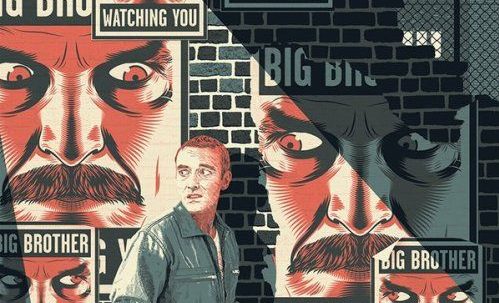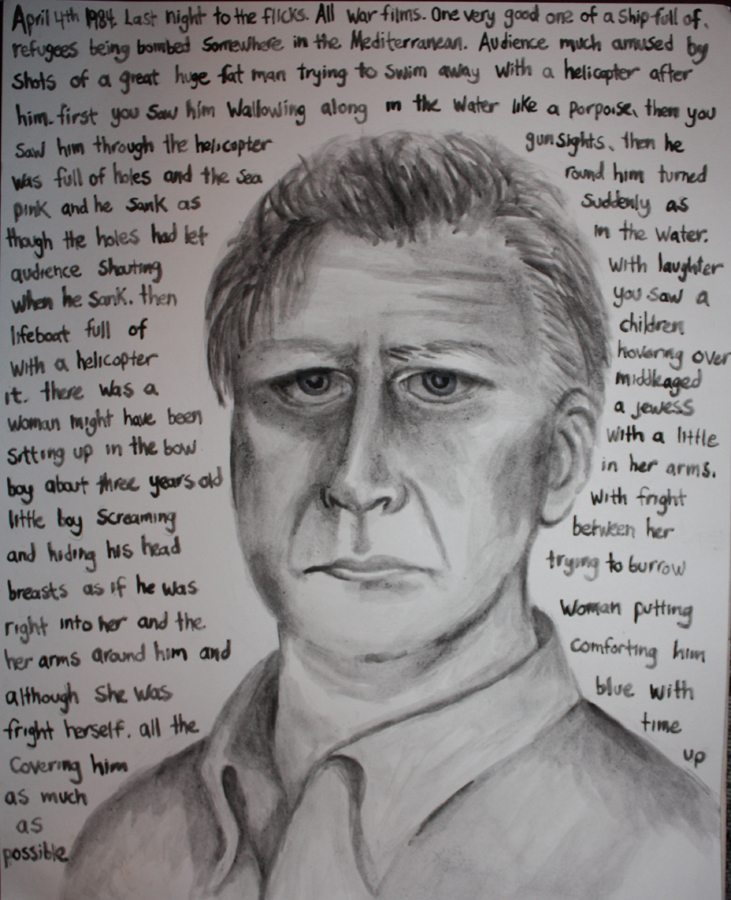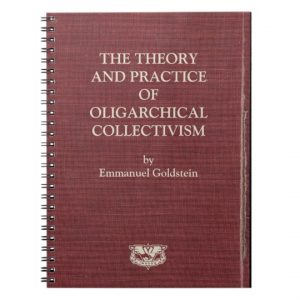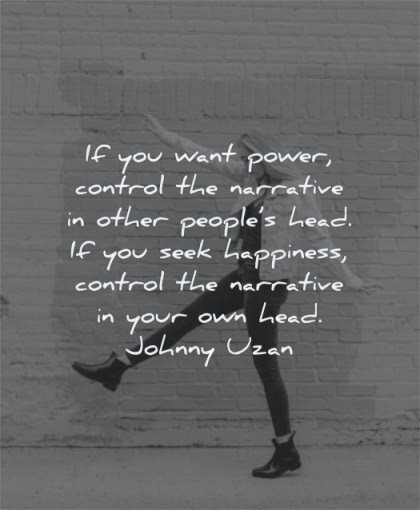
Literature in the digital sphere has established a culture of dependency on technologies and tertiary hearsay about facets controlling our everyday lives. In connection we have Snowden’s exposé on the NSA’s surveillance systems and the repeal of net neutrality that allows ISP’s to have grater control over our information systems and sell our data to third parties. The fears over our lack of privacy – ala Cambridge Analytica – is derived from greater fears of totalitarianism in our lands, which threaten to create a content population with a semblance of control. In Orwell’s 1984, this is the exact result in the people of Oceania knowing only of Big Brother and the reasons Oceania will remain in power, through complete dominance and control of information.
The Ministry of Truth and its figurehead Big Brother always watching and erasing history at its leisure are accompanied by the terrifying Thought Police. Even thinking of a crime is a crime punishable by erasure. All electronics are bugged and monitored, and the most personal thoughts are controlled to the conceptual level by the State. Sex is only for the sake of reproduction, and pleasures in life are not designed to be pleasures at all, which the people wholeheartedly except.
Except Winston.
That doesn’t end well, now does it?
Big Brother, based on the ending of the novel is seen having complete control of our “hero” through datamining, surveillance and brutal government control. Schemes built into the system to weed our dissenters caused Winston to journey not to topple Big Brother, but to reaffirm the sanity he had left. Naturally, we look to 1984 as a cautionary saga of what it means to oppose a systematic power structure designed to keep intelligence and awareness at a minimum, as Orwell intended the book as a critique of English Socialism and the Cold War and Stalinism.

Orwell’s appendix following “THE END” are swath with scholarly referencing and learned prose, but reading it permits the idea that Big Brother, in ironic fashion, would be defeated later. Beyond Winston’s penchant for paranoia and inaction, he desperately desires to be sure of his place, to know he is not insane, and to know the Party is flawed and susceptible to dissent. As he lives, this never comes to fruition. Not because there are no brave souls seeking to oppose the totalitarian nightmare, but because they cannot communicate nor think the words to begin with. This is Orwell’s allusion to the erosion of the thought process, as we learn to speak before forming complex thoughts. The people of Oceania are forced to use Newspeak in their world and do away with all traditional languages such as English, which reduces speech patterns of the people to simple phrases and gestures.
The Party and the Ministry of Truth has designed society to form where the poor indulge in their minimalist lives, which the middle classes are content with their possessions. In both worlds, there is a distinct absence of laughter, literature, art, curiosity, and sensual pleasures to better facilitate non-expression.
Newspeak’s purpose is to narrow the range of thought a person could have, as there are no words nor other languages in which to express a comprehensive thought. Everyone must live and speak simply, dependent on the workings of the Party. Per Orwell, so long as there exists an expansive system of language, we will always have freedom and the ability to rebel against governmental powers.
So why state here that Big Brother and Oceania would collapse if Newspeak is as broad and terrifying force as it is?
The African Front
The book shares news of the bad tidings on the African front in the war against Eurasia, which should have been censored before ever airing. This is an unusual case, given that absolutely no slander or negative news about Oceania were allowed to be broadcast, and any hard and digital documents that could make this claim were immediately revised. At the same time, earlier in the book we are told that Big Brother made a calculated error in predicting that Eurasia would attack India when they attacked the norther coasts of Africa, which caused the retreat of the Oceanic forces. The people swarmed to praise Big Brother’s defense and tactical restyling at the mishap though never questioned how the error could have happened. Big Brother is designed to be eternal in spirit and mind, with unfailingly precise calculations and deductive ability. The air of omniscient (which was implied but never stated) is called into question.
All economic disparities in Oceania were erased, an example being the bootlace quota. The Ministry of Truth would observe the lack of bootlaces and failing to meet the quota and would immediately vet and falsify the records to refute reports anyone could produce. Information was constantly suppressed and revised with the false news report being given to the general populous.
Following Winston’s torture following finding information and a photo that disputed the published news, the broadcasting stations and the Inner Party seemed to recognize that the negative publicity was leaking in many places. They then decided to publish these dark tidings sin their own way, with several examples given in the book. At no point do these reports indicate failings of the Party, Ministry or Big Brother, but slander the opposing superstate:
- 1983. Eurasia assaults the African front. Big Brother is forced to suppress this news among the general people. Winston remembers seeing this information before its publishing, and realizes the Party has altered the specifics to make it appear that Big Brother has predicted the assault but could not depend on the thinned ranks defending North Africa.
- Mid-1984. The War against Eurasia goes south and Oceania must retreat to South Africa to consolidate their forces and resources, and any forces on the battlefield who speaks of a dire situation is branded a thought criminal and promptly executed, erased and/or “cured” of these thoughts. Without intelligent and experienced troops in the region, the forces are comprised of new recruits and soldiers who are not adapted to fighting in weathered environments or rough terrains. The Party then hopes that Eastasia would attack Eurasia and drive attention away from the failing Oceanic forces. This does not happen.
- End-1984. Eastasia assaults Oceania and sides with Eurasia, causing a 2:1 war between the three superstates. India is attacked by Eastasia while Eurasia continues to pillage Africa, leaving Oceania falling on two fronts as dissent builds inside its walls. The news then switches sides and reports war with Eastasia only, and all documents and thoughts are revised so a war with Eurasia could not exist.
- 1985. Winston’s plot to uncover the truth is discovered and he is imprisoned. The War on both fronts are crippling Oceania’s political hold on territories and is forced to retreat. This is exasperated by Oceania constantly persecuting and erasing its people for dissent (i.e. officers offering advice on military policy and being considered a thought crime), which leaves no tactical ability for its forces. The failing of the Oceanic army is chalked up publicly as Eurasia and Eastasia being savages without honor and effectively bullying the world.
- Late-1985. Winston is finally released and Oceania’s control of territory and its military is on the brink of collapse. Johannesburg is the only remaining city in South Africa that Oceania has control of, with Eastasia and Eurasia closing in from the Northern territory they have annexed. Ironically, severe manipulation and control of the press is causing people to misread the situation and make the battle crisis worse. The Inner Party decides to reveal the truth about the African front to garner support from the people due to honest transparency. This would allow policymakers to properly assess the situation and form a plan to recapture their lost territories. This specific event takes place near the end of the novel where Winston is watching the news.
- 1986. The transparency project fails, and Oceanic forces are obliterated from lack of resources or manpower. Eurasian forces now control the majority of the Western hemisphere, while Eastasia controls the Eastern hemisphere. The Party decides to walk back the information about the African front and return to publishing doctored documents and footage depicting Oceania winning the War and reclaiming Africa. Winston understands this to be false, but is powerless to change the flow of events when the Party controls Oceanic history. Without military might, Oceania is at the mercy of Eurasia.

Goldstein’s book, The Theory and Practice of Oligarchical Collectivism makes the prediction that any superstate imposing too far on enemy territory and annexing it as a condition for superstate collapse. Eastasia and Eurasia’s assault on Oceanic forces was a defiant act against the unwritten understanding that the three powers should never upset the balance. Given that the Book contains the truth about the Party as well as a model for overthrowing them, the collapse of Oceania could use Goldstein as a scapegoat for inciting political dissidence and hysteria among the people. We later learn the book is a bait trap set by the Party to create and capture rebels, so it becomes a vicious cycle of the Party causing and ending its own attacks against itself.
As we do not have details of what Eurasia and Eastasia are like, they could be considered “normal” nations by our standards, without manipulation and destruction of its history, rather than equals to Oceania and so do not have books as Goldstein had written. The total control Oceania had over the people and its alliance with foreign allies were both at risk of destruction.
Craig Carr’s The Evolution of Oceania offers an interpretation of the superstates’ relationship:
The three states have been at war with each other since the 1960s.[8] By 1984 it has become a constant, and they regularly change allegiance with each other.[10] Each state is self-supporting so they do not war over natural resources, nor is the destruction of the opponent the primary objective; for, even when two states ally against the third, no combination is powerful enough to do so.[24][25] According to Fabio Parasecoli, war is necessary to use up the oversupply constantly generated by the respective extreme forms of capitalism…
…From this analysis stems the policy of permanent warfare: by focusing production on arms and materiel (rather than consumer goods) each state can keep its population impoverished and willing to sacrifice personal liberties for the greater good.[8] The peoples of these states—subject to shortages, queues, poor infrastructure and food— “are no longer domesticated or even able to be domesticated”
Craig Carr, The Evolution of Oceania, p. 28
It was presumed that the War was fictitious, and Oceania would always have one enemy and one ally in the war. Yet the constant production of guns and materials have left workers, hungry, unable to think or act, and are wholly dedicated to the war efforts. War hysteria is prominent among every social class, as a way to cover for the flaws of the front. Eurasia and Eastasia’s double team assault on Oceania either admits the war is real, the alliance was a lie and implies Oceania is a global threat, or Oceania is too weak a nation to repel the superstates, and has lied about its power. Only then with no options left did the Party choose to reveal the truth.
Big Brother is Eternal
Despite arguing for the collapse of Oceania via the three superstates’ War, Carr’s work is littered with bleak tones regarding the massive, permanent power of Big Brother. He writes,
The demise of Winston’s personal revolution is accompanied by the realization that no revolution is possible in Oceania… There will be no political transformations in Oceania; political change has ended because Big Brother will not let it happen.
Carr, The Evolution of Oceania p. 5
I am reminded here of Yevgeny Zamyatin’s We, of which 1984 is partially based off in defense (but not agreement) with Carr’s theory. With the revolution in that story coming to a close, the One State is on the verge of catastrophic collapse, which endangers everyone due to a lack of centralized government. However, Oceania, Carr argues, cannot collapse as there will always be an Inner Party working to ensure the perseverance of Big Brother’s resounding ideologies of steadfast control. To leave the people and technologies in eternal stasis.
If “power” is used as a concept of control, Orwell’s character O’Brien embodies the teachings of the Inner Party, and gives Winston a horrifying lesson during his “rehabilitation”:
We know that no one ever seizes power with the intention of relinquishing it. Power is not a means; it is an end. One does not establish a dictatorship in order to safeguard a revolution; one makes the revolution in order to safeguard the dictatorship. The object of persecution is persecution. The object of torture is torture. The object of power is power. (Orwell, 1961: 217-218)
Orwell, 1984 p. 217
Without inner dissent, Oceania could only be destroyed as a result of war. Which leaves a political shadow. Without the nation of Oceania standing, the ideology and power of Big Brother would remain, free to be spread to the remaining two superstates and creating rebellion within those walls. However, if Oceania could so simply be destroyed, and if it is based on Britain, it may represent a closed off hermit nation that pretends to be a superstate like Eurasia which represents a far larger Russia.
There are implications in the novel that there is a shortage of materials and experienced manpower which directly affects weaponry, defense systems and creating inept officers. This is a direct result of the Party incriminating those who become intelligent and powerful as a means of suppressing the minds of the people, as though the Party indirectly eliminated itself. Publishing stories of their own demise was the first step Oceania had begun to crumble, and Winston’s acceptance of Big Brother left him trapped in his own mind, unable to take part in the coming change in history. An analogy that comes to mind is holding sand; the harder you grip it, the faster it slips between your fingers.
The Danger of Revisionism

Revisionism is defined as a conscious, intentional misstatement and misrepesentation about an event in the past. Revising history is often ascribed to the “winners” of a conflict who would prefer to perpetuate their party or group as dominant and just. If defined as historical negationism, distorting the historical events and the flow of time in relation to those events are manipulated in favor of one’s speech. Per 1984, the analogies used relate best to Russia and Germany’s Soviet and Nazi parties for the denial of the Holocaust and the historical restrictions against Soviet crimes, respectively.
Denial in revisionist history is a specific caste of revision. Here, denial protects information from being released and claiming that accepted facts are untrue. One example lives in World War II lore with the massive amount of war crimes and crimes against humanity committed by all parties in the War.
Trivialization is another deadly effect of controlling history. When American troops committed the My-Lai Massacre during the Vietnam War, great steps were taken to mitigate what journalists would publish, which took years after the massacre to be released. When it was, the American troops who committed the act were met with worldwide scorn and interpreted as violent brutes (this is later depicted in Japanese games depicting Americans such as Contra). As time passed, the lives of the 504 people killed were slowly forgotten as Operation Babylift took off, which renditioned/evacuated/kidnapped 3,300 babies and 110,000 refugess from South Vietnam, and the babies were placed with new families. The next world event trivialized the trauma of last weeks’ causing a collective pain on the people affected by a controlled historical narrative.

The danger is not in practicing revisionist history—it’s in constructing individual and collective lives around historical frameworks too shaky to be looked at again. It eliminates the presence of people of color and affected groups who have been negatively affected by the change in narratives, scapegoating them as aggressors and catalysts of a conflict. Revisionism in the positive way would include adding to the understanding of a subject and its historiography.
1984 has a powerful message beyond the dangers of mass surveillance. Nations fall, people change, but ideology always remains. Control the narrative, and you control the mind.
-N
Works Cited
Orwell, George, and Erich Fromm. 1984. New York, N.Y.: New American Library, 1961. Print.
Carr, Craig L. Orwell, Politics, and Power. New York: Bloomsbury Academic, 2010. Print.